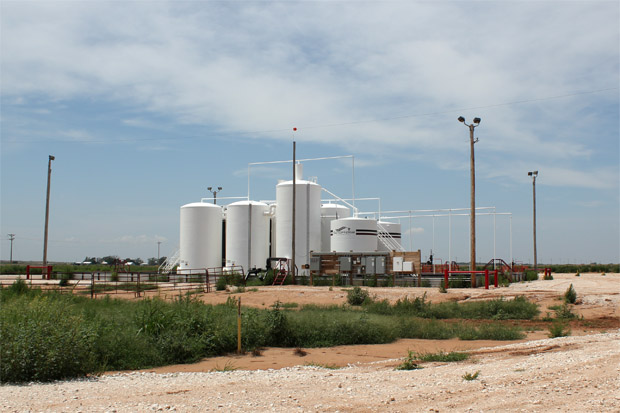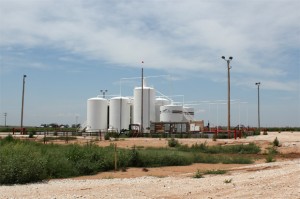
A disposal well in northwest Oklahoma.
Joe Wertz / StateImpact Oklahoma


A disposal well in northwest Oklahoma.
Joe Wertz / StateImpact Oklahoma

Joe Wertz / StateImpact Oklahoma
A disposal well in northwest Oklahoma.
Oklahoma is four years into a “swarm” of unusual earthquakes, and is now the second most seismically active state in the continental United States, an EnergyWire analysis shows.
Two hundred and forty earthquakes of 3.0 magnitude or greater — the threshold at which people can generally perceive them — have been reported in Oklahoma since 2009. That means 10 percent of the earthquakes in the continental U.S. have occurred in Oklahoma, according to the news service.
EnergyWire’s Mike Soraghan reports:
Most of the state’s quakes can be grouped into four seismic outbreaks since early 2009 that academics and researchers of various stripes have linked to oil and gas activities, primarily deep underground injection of drilling wastewater.
Drilling activity has been linked to earthquakes in other states, like Texas, Arkansas, Colorado and Ohio, but the link “has been tough to accept for many Oklahomans,” EnergyWire reports:
While they’re not used to earthquakes here, they’re quite accustomed to pump jacks and deep injection wells. Oklahoma is dotted with more than 4,500 such wells. Oil and gas is a pillar of the economy and provides a lot of solid paychecks in the state.
Skeptics note that drilling and injection had been going on for decades before the ground shaking of the past few years.
Oklahoma officials haven’t accepted the findings, even when they came from a professor, Katie Keranen at the University of Oklahoma, housed in the same building as the Oklahoma Geological Survey (OGS). Keranen, who has moved to Cornell University, linked the Prague quake to injection.
Some Oklahomans, like Jonny Hickman, told reporter Soraghan they believe there’s a link:
“Forty-five years I’ve lived on this hill,” said Hickman, 52. “I never felt anything until they started injecting that salt water.”
Others, like Love County Commissioner Herschel “Bub” Peery, share the oil industry’s skepticism:
“They’re blaming injection wells. I don’t really believe it,” he said. “A lot of people want someone to blame.”